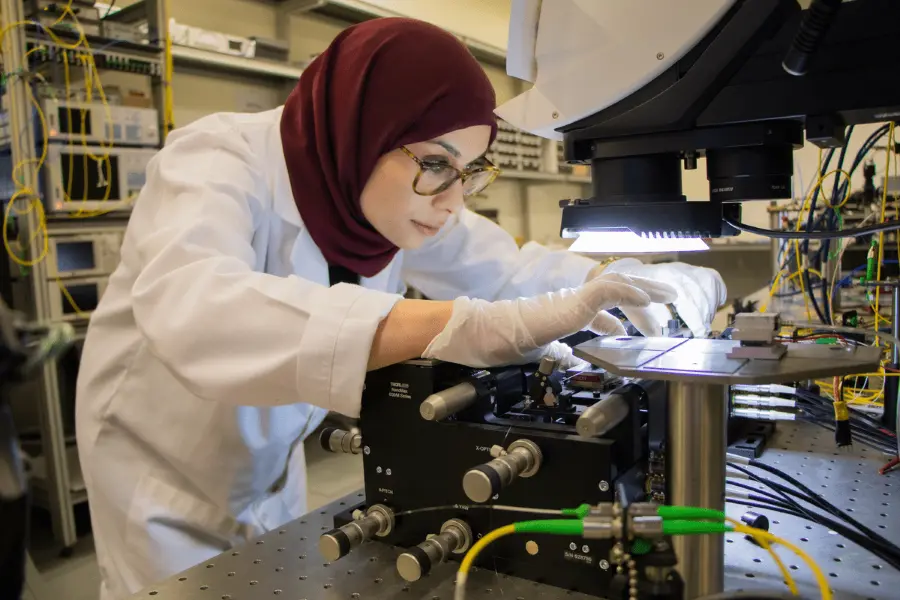PHOTO
Abu Dhabi, UAE: Responding to the increasing demand for efficient, tunable optical materials capable of precise light modulation to create greater bandwidth in communication networks and advanced optical systems, a team of researchers at NYU Abu Dhabi’s Photonics Research Lab (PRL) have developed a novel, two-dimensional (2D) material capable of manipulating light with exceptional precision and minimal loss.
Tunable optical materials (TOMs) are revolutionizing modern optoelectronics, electronic devices that detect, generate and control light. In integrated photonics circuits, precise control over the optical properties of materials is crucial for unlocking groundbreaking and diverse applications in light manipulation. Two-dimensional materials like Transition Metal Dichalcogenides (TMDs) and graphene exhibit remarkable optical responses to external stimuli. However, achieving distinctive modulation across a short-wave infrared (SWIR) region while maintaining precise phase control at low signal loss within a compact footprint has been a persistent challenge.
In a new paper titled “Electro-Optic Tuning in Composite Silicon Photonics Based on Ferroionic 2D Materials” published in Nature Light Science & Application, the team of scientists, led by Research Scientist Ghada Dushaq, and Associate Professor of Electrical Engineering and Director of PRL Lab Mahmoud Rasras, have demonstrated a novel avenue for active light manipulation through the utilization of ferroionic, 2D material CuCrP2S6 (CCPS). By integrating first-of-their-kind, two-dimensional and atomically thin materials into minuscule ring structures on silicon chips, the team has enhanced the efficiency and compactness of the device.
When integrated onto silicon optical devices, these 2D materials exhibit a remarkable ability to finely tune the optical properties of the transmitted signal without any attenuation. This technique has the potential to revolutionize environmental sensing, optical imaging, and neuromorphic computing, where light sensitivity is key.
“This innovation offers precise control over the refractive index, while simultaneously minimizing optical losses, enhancing modulation efficiency, and reducing the footprint, rendering it suitable for next-generation optoelectronics,” said Rasras. “There is an exciting range of potential applications, from phased arrays and optical switching to use in environmental sensing and metrology, optical imaging systems, and neuromorphic systems in light-sensitive artificial synapses.”
About NYU Abu Dhabi
www.nyuad.nyu.edu
NYU Abu Dhabi is the first comprehensive liberal arts and research campus in the Middle East to be operated abroad by a major American research university. Times Higher Education ranks NYU among the top 30 universities in the world, making NYU Abu Dhabi the highest-ranked university in the UAE and MENA region. NYU Abu Dhabi has integrated a highly selective undergraduate curriculum across the disciplines with a world center for advanced research and scholarship. The university enables its students in the sciences, engineering, social sciences, humanities, and arts to succeed in an increasingly interdependent world and advance cooperation and progress on humanity’s shared challenges. NYU Abu Dhabi’s high-achieving students have come from over 120 countries and speak over 100 languages. Together, NYU's campuses in New York, Abu Dhabi, and Shanghai form the backbone of a unique global university, giving faculty and students opportunities to experience varied learning environments and immersion in other cultures at one or more of the numerous study-abroad sites NYU maintains on six continents.




















